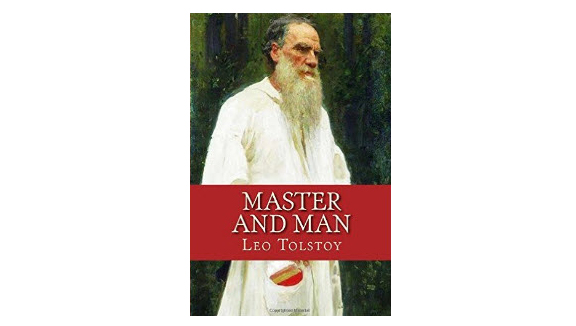I have a weakness for Tolstoy and the realism he uses to write his novels. I added “and the realism” but I’m pretty sure if Tolstoy wasn’t involved the realism wouldn’t be nearly as attractive. I’ve read books by lesser authors who took great pains to give minute details, but in many of those books the details are dead-weight. The authors seem to be using the details to say “Look what I am doing. Aren’t I grand.”
In Tolstoy’s books the details thrill me. They breathe life into his worlds which then turn into my worlds. For Tolstoy the details are the medium of expression just as color is the medium of expression for Monet. Tolstoy’s details are the existence of his characters.
Unlike Tolstoy’s great works such as Anna Karenina and War and Peace, Master and Man comes off as a short story in comparison. Perhaps due to the short space to tell the story Master and Man is crawling with details. They almost overlap and lay on top of each other, and yet the images formed are crystal clear and meaningful. Even the horse, Mukhorty, lives in his own unique way:
Picking his way out of the dung-strewn stable, Mukhorty frisked, and making play with his hind leg pretended that he meant to kick Nikita, who was running at a trot beside him to the pump.
“Now then, now then, you rascal!” Nikita called out, well knowing how carefully Mukhorty threw out his hind leg to touch his greasy sheepskin coat but not to strike him—a trick Nikita much appreciated.
The simplest of details is used to move the story along. As Andreevitch and Nikita head out in a sledge on business we feel the conditions in which they travel with a simple:
The snow swept down from a neighbouring shed and whirled about in the corner near the bath-house.
And then a few paragraphs later we get early signs of foreboding with these details:
As soon as they passed the blacksmith’s hut, the last in the village, they realized that the wind was much stronger than they had thought. The road could hardly be seen. The tracks left by the sledge-runners were immediately covered by snow and the road was only distinguished by the fact that it was higher than the rest of the ground.
We couldn’t celebrate Tolstoy’s details any more than we could celebrate Monet’s paint if they didn’t form a coherent picture. The picture in Master and Man centers on Andreevich, an ambitious merchant, and Nikita, a peasant laborer who often serves Andreevich. In just a few lines the relationship and personality of the two men starts coming into focus:
He was quite aware that Vasili Andreevich was cheating him, but at the same time he felt that it was useless to try to clear up his accounts with him or explain his side of the matter, and that as long as he had nowhere to go he must accept what he could get.
Now, having heard his master’s order to harness, he went as usual cheerfully and willingly to the shed, stepping briskly and easily on his rather turned-in feet;
We start to understand the Andreevich’s arrogance to cheat good men and call it fair, and Nikita’s easy humility.
In a few short chapters things go from bad to worse due to Andreevich’s insistence that they get to the desired destination where he aims to take advantage of a young landowner’s naiveté and purchase his woods for one-third the worth. He must get there in spite of the dangerous weather conditions before other merchant’s bid up the price .
The success of the book depends upon Tolstoy’s ability to make the reader accept a 180 degree change in Andreevich’s soul that happens within two or three short hours. We go from Andreevich leaving Nikkita to die in the blizzard:
“As for him,” he thought of Nikita—“it’s all the same to him whether he lives or dies. What is his life worth? He won’t grudge his life, but I have something to live for, thank God.”
To his decision to lay down on Nikita to try to warm him back to life:
“There, and you say you are dying! Lie still and get warm, that’s our way . . .” began Vasili Andreevich.
But to his great surprise he could say no more, for tears came to his eyes and his lower jaw began to quiver rapidly. He stopped speaking and only gulped down the risings in his throat.
“Seems I was badly frightened and have gone quite weak,” he thought. But this weakness was not only unpleasant, but gave him a peculiar joy such as he had never felt before.
Tolstoy had what many author’s today are missing—a clear sense of morality. I’m not talking about political correctness or popular sentimental movements, but a deep sense of what is right and what is wrong as it applies across the millenniums of mankind. This sense of morality plays out clearly in Master and Man. In lesser hands a sense of morality weights a book down and can warp the truths it is trying to convey. In Master and Man Toltoy’s understanding of the complexity of existence does not allow his sense of morality to become cumbersome and deadening. Instead, the mixture of complexity and moral intuition gives the story wings and it soars.

